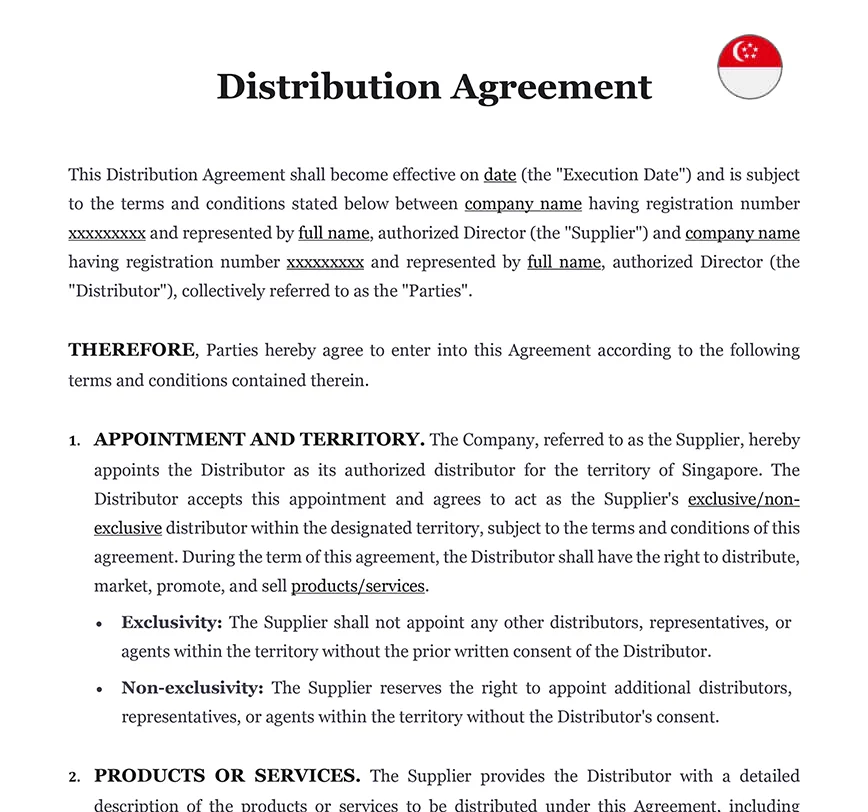Ready to use legal template
Drafted by experienced lawyers
Compliant with Singapore law
Ready to use legal template
Drafted by lawyers
Compliant with Singapore law
Home › Business contract › Distribution agreement
Learn more about Distribution agreement in Singapore
Looking for a reliable Distribution Agreement template in Singapore? Look no further! Themis Partner offers an easy-to-edit legal template expertly drafted by skilled lawyers, ensuring compliance with Singaporean law. Whether you are a distributor or supplier, this agreement covers all essential aspects to protect your rights and define the terms of your business partnership. Save time and effort with our user-friendly template and secure your distribution arrangements with confidence. Trust Themis Partner for all your legal needs and get your Distribution Agreement sorted today!
Table of contents
-
What is a distribution agreement and how does it function?
-
What a Distribution Agreement include?
-
What are the benefits?
-
How does it address issues of territory and exclusivity?
-
How does it define roles and responsibilities?
-
How does it protect the intellectual property rights?
-
How does it differ from a supply agreement?
What is a distribution agreement and how does it function?
A distribution agreement is a contractual arrangement between a supplier or manufacturer and a distributor. It outlines the terms and conditions governing the distribution of goods or products within a specific territory or market. In Singapore, it functions as a means of appointing a distributor to handle the marketing, sales, and distribution of goods on behalf of the supplier. The agreement defines the rights and responsibilities of both parties, including the scope of the distributor’s authority, the territory or market covered, pricing, payment terms, and any exclusivity or non-compete provisions. The distributor undertakes the responsibility of promoting and selling the supplier’s products, often by establishing a network of resellers or retailers.
It enables the supplier to leverage the distributor’s expertise and market presence in Singapore, expanding their reach and market share. It also establishes a framework for monitoring sales performance, handling returns or warranties, and resolving disputes.
By entering into the agreement, both parties can establish a mutually beneficial relationship that facilitates efficient distribution and contributes to business growth in the Singaporean market.
What a Distribution Agreement include?
1. Parties Details
The agreement should clearly identify the supplier and the distributor, including their legal names and addresses.
2. Territory
The agreement should define the specific geographic territory or market in Singapore where the distributor is authorised to distribute the supplier’s products.
3. Rights and Obligations
The agreement should outline the rights and obligations of both parties, including the distributor’s responsibilities for marketing, sales, and distribution, as well as the supplier’s obligations to provide the products in a timely manner.
4. Pricing and Payment
The agreement may specify the pricing structure, including wholesale prices, discounts, or any agreed-upon margins for the distributor. It should also outline the payment terms, such as the frequency and method of payment.
5. Exclusivity or Non-Exclusivity
The agreement may address whether the distributor has exclusive rights to distribute the supplier’s products within the defined territory or whether multiple distributors may operate simultaneously.
6. Marketing and Promotion
The agreement may outline the distributor’s obligations regarding marketing and promotional activities, including advertising, trade shows, or other promotional initiatives to enhance product visibility and sales.
7. Inventory and Delivery
The agreement may include provisions regarding inventory management, order placement, delivery schedules, and any minimum or maximum order requirements.
8. Intellectual Property
If applicable, the agreement may address the protection of intellectual property rights, such as trademarks, copyrights, or patents, and specify how they should be used or displayed in marketing materials or product packaging.
9. Term and Termination
The agreement should state the duration of the distribution relationship, whether it is for a fixed term or open-ended. It should also include provisions for termination, such as notice periods or grounds for termination.
10. Dispute Resolution
The agreement may specify a mechanism for resolving disputes, such as mediation or arbitration, to avoid litigation in case of disagreements.
ℹ️ It’s important to note that the specific content of a distribution agreement can vary depending on the nature of the products, the market, and the specific requirements of the parties involved.
What are the benefits?
| ➤ It allows the supplier to expand their market reach and access new customers in Singapore through the distributor's established network and expertise. This can lead to increased sales and market penetration without the need for the supplier to set up their own distribution channels. |
| ➤ The distributor benefits from having access to a wide range of products to offer their customers, allowing them to enhance their product portfolio and meet customer demand more effectively. |




